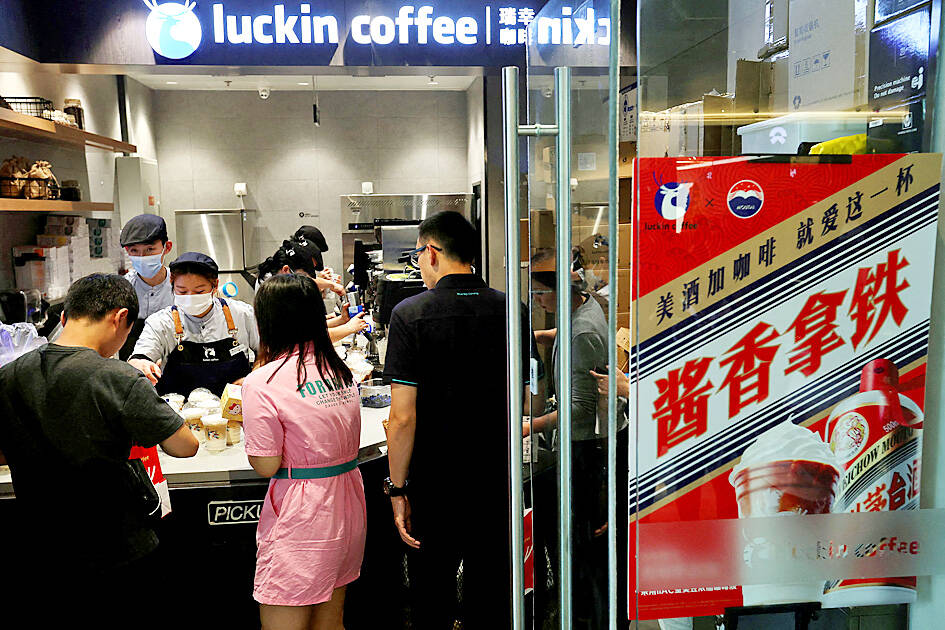Alcohol-infused chocolate balls are the latest item to take over China’s social media as consumers clamor for the surprise tie-up between liquor giant Kweichow Moutai Co (貴州茅台) and Mars Inc’s Dove brand.
The chocolates, which sell for 35 yuan (US$4.80) for two 10 gram pieces, sold out immediately when launched on Saturday and presales every day since are also sellouts. Despite some social media complaints about the high price, the chocolates are also proving popular on resale platforms, where 12 chocolates are selling for 500 yuan, according to local media reports.
The partnership follows Luckin Coffee Inc’s (瑞幸咖啡) popular launch earlier this month of an alcohol-infused latte, with Kweichow Moutai wanting to appeal to a younger demographic.

Photo: Reuters
The firm gets more than 80 percent of its revenue from moutai, a colorless but fiery liquor traditionally served at state banquets and popular among middle-aged consumers.
“As a traditional Chinese brand, Moutai needs to be forever young and embrace the young generation to enhance vitality,” chairman Ding Xiongjun (丁雄軍) said on Saturday.
Market watchers are split about the recent tie-ups translating into better sales over the long term. Bloomberg Intelligence has said it affirms the view that the distiller might continue with its accelerated efforts to rejuvenate the brand.
Others have warned that the low-cost items’ popularity may tarnish its luxury image.
“Marketing campaigns that link a premium brand like Moutai to too many mass-market consumption may not be helpful,” said Zhao Huanyan (趙煥焱), a Shanghai-based economist at Huamei Consulting Co (華美顧問).
The liquor firm has already sought to clarify its priorities, vowing to stick to its core business.
The collaboration is “trying to enhance Moutai’s competitiveness,” Ding said. “No matter how the time changes and how consumption is upgrading, Moutai started with liquor and will focus on liquor.”

MULTIFACETED: A task force has analyzed possible scenarios and created responses to assist domestic industries in dealing with US tariffs, the economics minister said The Executive Yuan is tomorrow to announce countermeasures to US President Donald Trump’s planned reciprocal tariffs, although the details of the plan would not be made public until Monday next week, Minister of Economic Affairs J.W. Kuo (郭智輝) said yesterday. The Cabinet established an economic and trade task force in November last year to deal with US trade and tariff related issues, Kuo told reporters outside the legislature in Taipei. The task force has been analyzing and evaluating all kinds of scenarios to identify suitable responses and determine how best to assist domestic industries in managing the effects of Trump’s tariffs, he

TIGHT-LIPPED: UMC said it had no merger plans at the moment, after Nikkei Asia reported that the firm and GlobalFoundries were considering restarting merger talks United Microelectronics Corp (UMC, 聯電), the world’s No. 4 contract chipmaker, yesterday launched a new US$5 billion 12-inch chip factory in Singapore as part of its latest effort to diversify its manufacturing footprint amid growing geopolitical risks. The new factory, adjacent to UMC’s existing Singapore fab in the Pasir Res Wafer Fab Park, is scheduled to enter volume production next year, utilizing mature 22-nanometer and 28-nanometer process technologies, UMC said in a statement. The company plans to invest US$5 billion during the first phase of the new fab, which would have an installed capacity of 30,000 12-inch wafers per month, it said. The

Taiwan’s official purchasing managers’ index (PMI) last month rose 0.2 percentage points to 54.2, in a second consecutive month of expansion, thanks to front-loading demand intended to avoid potential US tariff hikes, the Chung-Hua Institution for Economic Research (CIER, 中華經濟研究院) said yesterday. While short-term demand appeared robust, uncertainties rose due to US President Donald Trump’s unpredictable trade policy, CIER president Lien Hsien-ming (連賢明) told a news conference in Taipei. Taiwan’s economy this year would be characterized by high-level fluctuations and the volatility would be wilder than most expect, Lien said Demand for electronics, particularly semiconductors, continues to benefit from US technology giants’ effort

‘SWASTICAR’: Tesla CEO Elon Musk’s close association with Donald Trump has prompted opponents to brand him a ‘Nazi’ and resulted in a dramatic drop in sales Demonstrators descended on Tesla Inc dealerships across the US, and in Europe and Canada on Saturday to protest company chief Elon Musk, who has amassed extraordinary power as a top adviser to US President Donald Trump. Waving signs with messages such as “Musk is stealing our money” and “Reclaim our country,” the protests largely took place peacefully following fiery episodes of vandalism on Tesla vehicles, dealerships and other facilities in recent weeks that US officials have denounced as terrorism. Hundreds rallied on Saturday outside the Tesla dealership in Manhattan. Some blasted Musk, the world’s richest man, while others demanded the shuttering of his